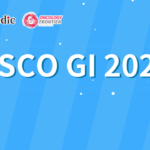
Presented by Dr. Susumu Hijioka at the ASCO Gastrointestinal Cancers Symposium, the STARTER-NET trial explores new frontiers in the treatment of gastroenteropancreatic neuroendocrine tumors (GEP-NETs).
Gastroenteropancreatic neuroendocrine tumors (GEP-NETs) are rare malignancies that frequently present at an advanced stage, where curative surgical intervention is not feasible. The STARTER-NET trial (JCOG1901) is a phase III study designed to evaluate the efficacy and safety of combination therapy with everolimus plus lanreotide versus everolimus monotherapy in patients with unresectable or recurrent GEP-NETs.
Study Design and Methods
The trial enrolled 250 patients meeting the inclusion criteria, including histologically confirmed G1/2 GEP-NETs (2019 WHO classification) and no prior treatment for metastatic or recurrent disease. The study followed a 1:1 randomization to either everolimus monotherapy (10 mg/day) or combination therapy with everolimus (10 mg/day) plus lanreotide (120 mg every 28 days). Patients were stratified based on tumor primary location and Ki-67 labeling index (LI) to assess treatment efficacy across different subgroups. The primary endpoint was progression-free survival (PFS), with overall survival (OS), objective response rate (ORR), disease control rate (DCR), and safety as key secondary endpoints.
Progression-Free Survival Outcomes

The updated analysis in November 2024 showed a median PFS of 13.6 months (95% CI: 9.1–19.4) in the everolimus group compared to 29.7 months (95% CI: 21.4–38.2) in the everolimus plus lanreotide group. The hazard ratio (HR) was 0.44 (95% CI: 0.28–0.69, p = 0.00016). An interim analysis in June 2024 involving 145 patients indicated a significant PFS benefit of 29.7 months for the combination therapy compared to 11.5 months for everolimus alone (HR: 0.38, p = 0.000017). Due to the high probability of superiority (98.1%) in the final analysis, the trial was terminated early for efficacy.
Subgroup Analysis of PFS
Subgroup analysis further demonstrated the efficacy of combination therapy across different primary sites and Ki-67 index levels. Among patients with pancreatic NETs (n = 118), the median PFS was 15.4 months (95% CI: 8.5–23.1) in the everolimus group and 38 months (95% CI: 22.1–47.0, p = 0.0011) in the combination group. For patients with gastrointestinal tract NETs (n = 50), median PFS was 11 months (95% CI: 7.4–18.0) in the everolimus group and 23.2 months (95% CI: 11.3–37.7, p = 0.12) in the combination therapy group. The efficacy was particularly significant in patients with a Ki-67 LI of 10% or higher, with a median PFS of 11.6 months in the everolimus group compared to 29.7 months in the combination therapy group (HR: 0.32, p = 0.0025).
Overall Survival Analysis
Overall survival data remains immature, but the one-year survival rate was 97.0% (95% CI: 88.4–99.2%) in the everolimus group and 96.2% (95% CI: 88.8–98.8%) in the combination therapy group, with an HR for OS of 0.74 (95% CI: 0.25–2.24).
Response Rates
The objective response rate was significantly higher in the combination therapy group at 23.0% (95% CI: 14.6–33.3%) compared to 8.3% (95% CI: 3.4–16.4%) in the monotherapy group (p = 0.011). The disease control rate was also higher with combination therapy at 92.0% (95% CI: 84.1–96.7%) compared to 84.5% (95% CI: 75.0–91.5%) in the everolimus group (p = 0.16).
Adverse Events
Adverse events were more frequent in the combination therapy group, with grade ≥3 events occurring in 35.6% of patients compared to 14.9% in the everolimus monotherapy group. Common adverse events included diarrhea (26.4% in everolimus vs. 36.8% in combination therapy), oral mucositis (67.8% vs. 62.1%), fatigue (19.5% vs. 28.7%), and hyperglycemia (33.3% vs. 26.4%). Despite the higher incidence of adverse events, they were manageable with appropriate supportive care and did not lead to a significant increase in treatment discontinuation.
Conclusions
The STARTER-NET trial provides strong clinical evidence supporting the combination of everolimus and lanreotide as a new standard first-line treatment for patients with unresectable or recurrent GEP-NETs, particularly those with poor prognostic features such as Ki-67 ≥ 10% and pancreatic NETs. Median PFS was nearly doubled with combination therapy, and ORR was significantly improved. The favorable disease control rate and manageable toxicity profile further reinforce the clinical utility of everolimus plus lanreotide in this patient population. Given these results, everolimus plus lanreotide has the potential to reshape the treatment paradigm for advanced GEP-NETs, offering a more effective therapeutic option with an acceptable safety profile.


